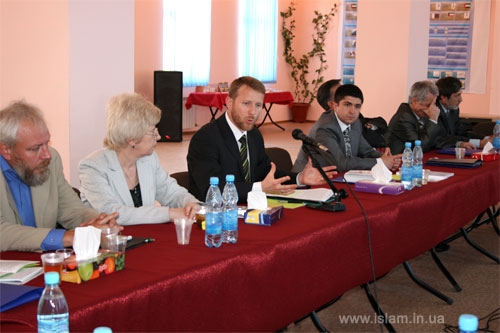In the capital of the Crimean peninsula on May, 14th, in the Islamic Cultural Centre took place a round table on a topic "Problems and Evolution Prospects of Polyethnic Societies in Crimea". The meeting dated to the Day of Science of Ukraine was organized by the Crimean branch of the Institute of Oriental Studies of the NSA of Ukraine and the All-Ukraine Association of Social Organization "Аlraid".
The subjects of the round table, so actual for Crimea, caused considerable interest from its participants. There were about 30 reports to discuss. Among them there were topics about the role of scientists in preservation of cultural heritage of Crimea, about a historical way of the people of Crimea on formation of cultural unity on peninsula, about the role of science in the life of society.
Interest caused the report on the contribution of Muslim scientists into the world civilizations and preservation of peace between the people. And the problem of interethnic and interreligious relations in Crimea became the most discussed topic. The Muslim point of view was stated by Seyran Arifov, the director of the High School of Hafiz, who spoke with the report "Islam and Regulation of Interethnic Relations".
Representing the review on the topic of contribution of Muslim scientists into the world culture, the Mufti of the SMMU "Ummah" Said Ismagilov presented to the participants of the round table the research on the topic "Ancient Philosophy in the Arabian-Muslim World".
In the course of his speech he emphasized that, "Muslims inherited, saved up and even rethought philosophical works of antiquity". The lecturer noticed that the period of blossoming of Islamic civilization was one of the most productive in the history of mankind attempts of mastering of another's philosophical heritage. Work on translation of philosophical works in Caliphate was conducted on the higher level than in medieval Europe and intended for much wider audience of Muslim "intelligentsia".
Mufti Said Ismagilov noted the basic difference of medieval Muslim scientists and European scientists. It is that those working in Europe were under the rigid control of Christian clergy of that time, and Muslim scientists at the same time had possibility to investigate the most various areas of a science, first of all, containing practical useful knowledge.
Many Islamic thinkers, besides philosophy, were fine experts in different scientific areas, they could be doctors and at the same time to be interested in natural sciences, therefore there was a set of translations of Galen, Hippocrates, Euklides and Archimedes. Even works in speculative subjects were also translated from practical reasons.
So rivalry between various trends in Islam, between Islam and other dogmas stimulated translation of works on philosophy and logic, perceived as a powerful measure in religious polemic.
Staff reporter,
Simferopol
Related Links:
In Irpen Took Place Cultural-Educational Female Seminar
"Al-Amal" Organized Cultural-Educational Action for Women
In Vinnitsa Took Place Seminar for Active Workers of Islamic Centres
In Kiev Took Place Scientific Conference in Islamic Studies Field



